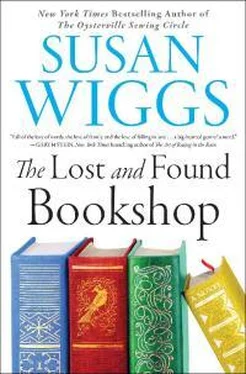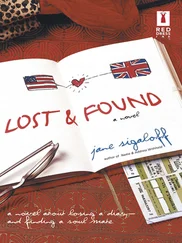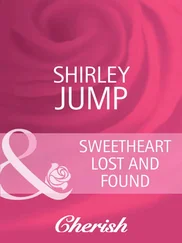“It’s Dorothy. Dorothy Gallagher.”
Grandy put his glasses back on. “I’m losing my memory.”
She pushed a finger at her chin and studied his face. “Where’d it go?”
“Like those seeds.” He gestured at the silver puff hedge. “Carried off someplace far away.”
“Maybe they’ll grow in a new spot.”
“I like that idea. Yes, indeed, that’s a fine idea, Dorothy.”
“I didn’t know it was your birthday, Mr. Harper. I don’t have a present for you. But . . .” Her eyes lit. “Hey! I have a surprise !” She ran and got her backpack and took out a little guitar.
No, Natalie realized. A ukulele.
Dorothy exchanged a look with Peach, who gave her a slight nod. She sat on the bench facing Grandy’s wheelchair. “I brought my uke to school for Show and Tell today. Ready?” she asked.
“I’m all ears, young lady.”
She adjusted the tuning, her head tilted to one side. Natalie glanced at Peach, then took a seat on the dry grass in front of the bench, and he joined her there.
Dorothy strummed tentatively and gradually seemed to gain confidence as she repeated a series of chords. Then she sang “Somewhere Over the Rainbow,” the gentle Hawaiian version, sweetly soothing. Her voice was breathy and pure and unschooled. Passersby slowed their pace, and a few lingered to listen. Natalie watched the interplay between Dorothy and Grandy, and her heart melted.
At the end of the little song, Grandy applauded, smiling from ear to ear. “That was the nicest birthday surprise of the day,” he told her. “Thank you, Dorothy.”
“Welcome! I played it at school today, and I think I did real well.” The little girl looked up at Peach. “Aw, Dad. Really? ”
Peach dabbed a bandanna at his cheeks, his sentiment on unabashed display. “Can’t help it, squirt. Whenever I hear you sing like that, it makes me cry big giant man tears.”
Dorothy put away her ukulele. “Good to know.”
What a lucky woman Peach’s wife was, having these two, thought Natalie. She jumped up. “I have a little something for all of us.” She opened the box from Sugar. “Birthday cupcakes!”
“Really? For us?”
“Really. I got a couple of extras for Bertie and Cleo. But . . . first come, first served, right?”
“Right!”
“There’s chocolate, vanilla, strawberry, and rainbow unicorn.”
Dorothy’s eyes devoured the gorgeous little cakes. Then she glanced over at Grandy. “It’s your birthday. You pick.”
“Well, chocolate for me,” he said, helping himself.
Natalie glanced at Peach, and somehow knew. “I’ll take the strawberry and we’ll give your dad the vanilla one. Guess that leaves the rainbow unicorn for you.”
11
While working on restoration jobs and repairs, Peach often found himself privy to bits and pieces of people’s lives. Something about the work he did tended to make him invisible to clients. At various stages of a job, he’d encountered closets full of hoarded things, priceless artifacts on display, careless messes not meant to be noticed. He’d overheard heated arguments and inane, rambling conversations, silly jokes and words of kindness, kids being scolded, music blaring, disasters being navigated, tragedies playing out: people living their lives.
Many projects took weeks or months, and he became a fixture, like part of the woodwork or a tool left lying out. People didn’t forget he was there, but as they acclimated to his presence, pretenses were dropped and they became more like themselves around him. A silent observer, he didn’t want to intrude, but sometimes it couldn’t be avoided. For the most part, people’s day-to-day lives revolved around mundane matters, yet there were occasional flares of drama, humor, or poignancy. Sometimes bits of his observations made their way into the songs Peach wrote. He once composed an entire ballad about a woman putting her late husband’s shoes into a charity box.
You never knew what would spark inspiration.
He suspected he would probably write a song about Natalie Harper. She was stressed to the max, in the middle of a multiact shit show, inheriting the shop as well as old Andrew, who was clearly having serious memory problems. Based on the calls he overheard, she’d also inherited a load of money troubles, not to mention a building that was dying of neglect.
Something about her touched him in a soft spot. It had been a surprise to run into her in the park the other day, but San Francisco was like that, a big city made up of small towns where people knew each other. With her old granddad, she’d been as sweet as those cupcakes. With customers, unfailingly polite. With Peach—hard to read.
And she was so damned pretty—small and graceful, with tender-looking skin and enormous eyes that hid nothing. She was a mixture of delicate and fierce. Dainty hands that flew over the keyboard, particularly when calculating spreadsheets. She dressed plain, like in a navy skirt and sweater and flat shoes—a sexy librarian. He could watch her all day.
She seemed like a nice woman. Nice, but troubled. Suzzy—his always-opinionated housemate and cowriter—would call that a red flag. But it wasn’t Natalie’s fault her mother had died and she had moved to the city to help her grandfather and was somehow trying to have a life.
Red flags or not, Peach wasn’t interested in a relationship. He had learned his lesson soon after the divorce. He’d dated a woman who had checked all the boxes—kind, beautiful, smart—yet she’d failed to hide her resentment of Dorothy, which was a deal killer. Another girlfriend had seemed nice enough, but she wanted kids of her own, and she wanted them right away.
Peach had shied from that. He never, ever wanted Dorothy to think she wasn’t enough for him. In the unlikely event that he ever felt like going down that path again, he planned to take his sweet time doing it.
These days, he was a monk. No drama. No complications. Work and the band and Dorothy kept him busy enough. Natalie Harper was tempting but would only ever be a client.
He didn’t want to add to her stress, but the repairs and restoration on her place were going to take a while, and the project wouldn’t be cheap. He felt bad about how much work would be needed to rescue the venerable old building. She was in good hands with him. He knew what needed to be done, he knew how to do the work, and he wouldn’t overcharge.
Suzzy sometimes chided him for charging reasonable rates here, in the heart of the wealthiest city in America. “Dude,” she would say. “It’s one of the perks of living in San Francisco. You’re surrounded by people who rake in the dough. You should feel free to share in the bounty.”
“Don’t call me dude. Nobody says dude anymore.”
“I do. Some dude gave me a hundred-dollar tip yesterday morning, and all he had was an egg white omelet. And I was like, ‘Thanks, dude.’”
Peach suspected the tip was more about her tight skirt and red cowboy boots and the treble clef tattoo on her dainty collarbone than it was about the omelets she served at Spotters, the buzzy breakfast place where she worked while waiting to be discovered. Suzzy didn’t advertise the fact that she was happily married to Milt, their drummer, because she swore the tips were better that way. She and Peach had even done a song about it—“Color Me Regressive.”
It was pretty clear that Natalie Harper was not going to be the kind of client he often encountered, the kind with more money than sense. He had recently finished a job for a couple who had spent a small fortune importing a set of library doors from London because they matched an antique mantelpiece in their Nob Hill home. Another client had commissioned a glass countertop so big that they had to take out part of a wall in order to get it inside.
Читать дальше












